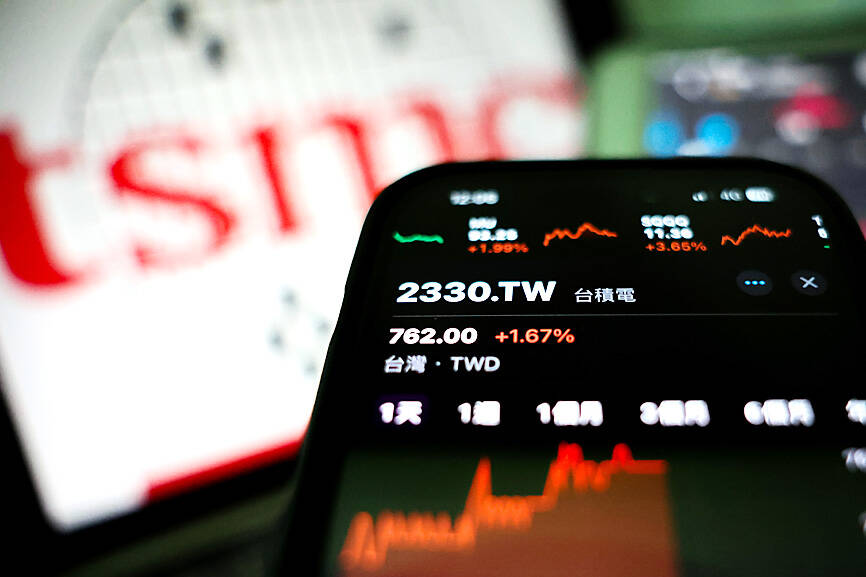Taiwan Semiconductor Manufacturing Co (TSMC, 台積電) plans to build two new advanced chip packaging fabs in Chiayi County to address a supply scarcity driven by rapidly growing demand for artificial intelligence (AI) chips, Vice Premier Cheng Wen-tsan (鄭文燦) said yesterday in Chiayi County.
TSMC is set to start construction of the first advanced chip-on-wafer-on-substrate (CoWoS) packaging fab at the Chiayi section of the Southern Taiwan Science Park (南部科學園區) in May, Cheng said in Chiayi County.
Construction is expected to be completed in 2026, creating 3,000 jobs, he added.

Photo: CNA
Cheng made the announcement after meeting yesterday with TSMC vice president for operations and facility Arthur Chuang (莊子壽), Minister of Economic Affairs Wang Mei-hua (王美花) and several Chiayi County Government officials, nailing down the investment project.
TSMC and the Southern Taiwan Science Park earlier this month signed a lease for a 12-hectare plot of land, park director-general Su Chen-kang (蘇振綱) said yesterday.
Chiayi County Commissioner Weng Chang-liang (翁章梁) said the county is well-prepared to house TSMC’s new plants and believes the project would pave the way for attracting investments from companies in the supply chain and help it develop more high-value industries.
Earlier yesterday, Reuters reported that TSMC is considering building CoWoS technology capacity in Japan, where the chipmaker has opened a wafer fab in Kumamoto.
“In response to strong market demand for advanced packaging capacity, TSMC is planning to set up advanced packaging capacity in the Chiayi science park,” TSMC confirmed in e-mailed statement, ending months of speculation.
It did not provide financial details about the new investment.
CoWoS demand is “very strong,” TSMC chief executive C.C. Wei (魏哲家) told investors in January.
The world’s largest contract chipmaker counts Nvidia Corp and Advanced Micro Devices Inc among its major AI chip clients.
TSMC plans to double its CoWoS capacity this year from a year earlier, as booming generative AI applications stimulate demand for AI and high-performance computing chips, it said.
The company has been developing advanced packaging technologies for more than 10 years, including CoWoS, 3D chips and system of integrated chips (SoIC). It expects advanced packaging capacity to enjoy a compound annual growth rate of more than 50 percent in the next few years.
“TSMC’s latest CoWoS capacity expansion is crucial for the world and Taiwan, since 100 percent of the advanced AI chips consumed by the world is produced in Taiwan,” Wang said. “TSMC has received massive orders, but insufficient CoWoS capacity has hindered” shipments.
TSMC’s latest investment would help boost the local semiconductor ecosystem and assist local semiconductor equipment and material suppliers to build a greater presence in semiconductor backend processes, Wang said.
Additional reporting by CNA

NEXT GENERATION: The four plants in the Central Taiwan Science Park, designated Fab 25, would consist of four 1.4-nanometer wafer manufacturing plants, TSMC said Taiwan Semiconductor Manufacturing Co (TSMC, 台積電) plans to begin construction of four new plants later this year, with the aim to officially launch production of 2-nanometer semiconductor wafers by late 2028, Central Taiwan Science Park Bureau director-general Hsu Maw-shin (許茂新) said. Hsu made the announcement at an event on Friday evening celebrating the Central Taiwan Science Park’s 22nd anniversary. The second phase of the park’s expansion would commence with the initial construction of water detention ponds and other structures aimed at soil and water conservation, Hsu said. TSMC has officially leased the land, with the Central Taiwan Science Park having handed over the

The Philippines is working behind the scenes to enhance its defensive cooperation with Taiwan, the Washington Post said in a report published on Monday. “It would be hiding from the obvious to say that Taiwan’s security will not affect us,” Philippine Secretary of National Defense Gilbert Teodoro Jr told the paper in an interview on Thursday last week. Although there has been no formal change to the Philippines’ diplomatic stance on recognizing Taiwan, Manila is increasingly concerned about Chinese encroachment in the South China Sea, the report said. The number of Chinese vessels in the seas around the Philippines, as well as Chinese

AUKUS: The Australian Ambassador to the US said his country is working with the Pentagon and he is confident that submarine issues will be resolved Australian Ambassador to the US Kevin Rudd on Friday said that if Taiwan were to fall to China’s occupation, it would unleash China’s military capacities and capabilities more broadly. He also said his country is working with the Pentagon on the US Department of Defense’s review of the AUKUS submarine project and is confident that all issues raised will be resolved. Rudd, who served as Australian prime minister from 2007 to 2010 and for three months in 2013, made the remarks at the Aspen Security Forum in Colorado and stressed the longstanding US-Australia alliance and his close relationship with the US Undersecretary

‘WORLD WAR III’: Republican Representative Marjorie Taylor Greene said the aid would inflame tensions, but her amendment was rejected 421 votes against six The US House of Representatives on Friday passed the Department of Defense Appropriations Act for fiscal 2026, which includes US$500 million for Taiwan. The bill, which totals US$831.5 billion in discretionary spending, passed in a 221-209 vote. According to the bill, the funds for Taiwan would be administered by the US Defense Security Cooperation Agency and would remain available through Sept. 30, 2027, for the Taiwan Security Cooperation Initiative. The legislation authorizes the US Secretary of Defense, with the agreement of the US Secretary of State, to use the funds to assist Taiwan in procuring defense articles and services, and military training. Republican Representative